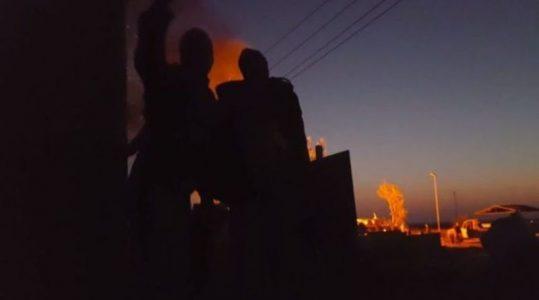
Al-Fuqaha attack highlights the Islamic State’s growing confidence in Libya
On October 29, the Islamic State’s affiliate Wilayat Libya-Barqah claimed responsibility for a highly orchestrated attack in the town of al-Fuqaha, located in Jufra District. According to the group, its fighters carried out an assault on the town and gained control over it for several hours.
In the process, IS militants set ablaze the local police headquarters and raided homes of alleged security personnel and individuals suspected of collaborating with the Libyan National Army and killed and detained multiple security personnel. At the same time, the group claimed a suicide bombing, followed by an armed assault, on a checkpoint along the Jufra-Sebha Road, which it said resulted in the killing and wounding of several LNA troops. Finally, IS claimed to have detonated an improvised explosive device on LNA forces pursuing fighters along the Desert Road.
The incident comes amidst an increase in IS activity and attacks in Libya, including in its central parts, over the past months, illustrating its growing capabilities and entrenchment in the country.
On September 11, the jihadist group claimed a shooting attack on the headquarters of Libya’s National Oil Corporation in Tripoli. IS’s capacity to carry out such attacks can in part be attributed to the vast ungoverned areas of central Libya, which enables the militants to operate more freely, as well as to the potential deployments of some IS fighters fleeing from Syria and Iraq, in light of the organization’s persistent setbacks in these countries.
Strategically speaking, assaults of this sort further highlight Libya’s heightened priority for the group.
Libya’s continued instability, despite recent agreements between the country’s two main political bodies, namely the House of Representatives and the United Nations-backed Government of National Accord, provides IS fertile ground to consolidate a foothold in the country.
More specifically, by conducting acts of militancy in more outlying regions of Libya, such as Jufra District, the Sunni jihadist militant group likely seeks to draw forces away from IS’s most desirable target, namely the Oil Crescent region. In the long run, a dwindling security presence in this region would enable IS militants to target the facilities there and hurt this vital sector, the survival of which is desperately needed to secure Libya’s stabilization.
However, more interestingly, the wording of the recent claim of responsibility reflects the Islamic State’s above-mentioned goals, as well as to those of the central organization to a degree, in an extraordinary manner.
First, although the change had been in place for several months, the group officially replaced the name of the Wilaya with the name of the country, followed by the name of the traditional Wilaya (Wilayat Libya-Barqah, as opposed to just Wilayat Baraqh).
This change suggests a reorganization of the group’s ranks, as backed by multiple reports from recent months, likely as an adaptation to the new situation in the wake of the loss of almost all of its held territories in Iraq and Syria. This new structure may enable IS Central to control and instruct its affiliates in a more direct manner, as now there are likely less personnel in the chain of command through which the instructions run. This renders greater effectiveness amidst IS’s overall transformation into a more guerilla-type force.
Furthermore, the latest claim underscores IS’s ongoing propaganda efforts and attempts to project heightened capabilities. IS uses the word City (‘Madinah’ in Arabic) to describe al-Fuqaha: “…and killed some of its elements [LNA troops], detained others, and took over the City for several hours.” This is contrary to the other parts of the statement in which IS referred to al-Fuqaha as merely a “town.”
This likely exaggeration in regards to the town’s size is an attempt to boost the group’s achievement and impact the reader’s perception of the jihadist organization’s capacity.
An additional example comes at the beginning of the fifth sentence: “resulted in the arrest of several wanted personnel…” By using the word “wanted,” IS likely seeks to project a degree of administrative and official governing capacity, as it implies a level of judicial procedure.
Later in that sentence, IS stated that it “burnt their homes after evacuating the women and children.” This is an obvious appeal to potential supporters, possibly al-Qaeda-linked elements operating in Libya, as well as other radicalized individuals, as it portrays IS as adhering to a moral code.
To sum things up, the claim of responsibility for the attack in al-Fuqaha demonstrates and reflects the Islamic State’s continued efforts to bolster its foothold in Libya. This includes a shift in the group’s tactics, as well as an effort to attract local and regional support from radicalized elements. In light of its loss of territories in Iraq and Syria, the jihadist organization’s affiliate in Libya may strive to appear a viable alternative to its former strongholds.
Source: Defence Post





